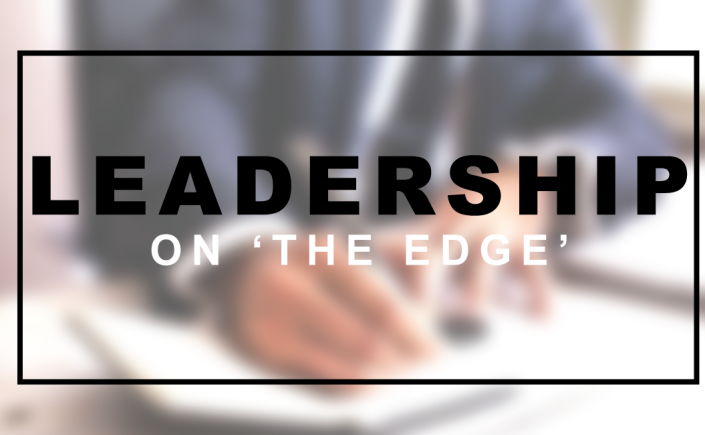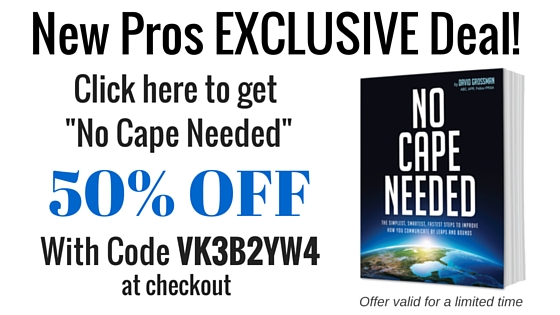Editor’s Note: This is the third in a series by leadership and communication expert David Grossman, ABC, APR, Fellow PRSA. In the first two posts, David discussed the importance of leadership today and the keys to effective leadership (with some great input from readers of this blog!)
Leadership Is Easier When You Are Authentic
Growing up, I found myself on the “Supposed To” track. The feelings I allowed myself to have as a child, teenager and adult were solely happy feelings; the rest of my feelings went into this black hole never to be discovered or talked about.
At age 33, I had achieved all of what I was supposed to and more, and found myself in a therapist’s office. In talking about my challenges, I had put on the veneer of my polished, professional self. It’s then that I grabbed the pillow next to me and clenched it to my chest. Hard. In that moment, there was a huge disconnect between the words I was saying and my feelings.
My therapist and I now laugh about the pillow that launched my journey of authenticity – one I wish I had started years earlier.
As we think about leadership today, starting on (or continuing on) a path toward authenticity is a way all leaders can make a difference – for themselves and for others. Authenticity matters today. Authentic leaders get better business results, have healthier work lives, and excel in real, meaningful relationships. They sleep better at night.
The Road Less Traveled: A Journey of Authenticity
What’s essential for your Journey of Authenticity is to come at it from a place of self-knowledge instead of coming from a place of responding to stress, worry, or anxiety. This means being as purposeful as you can on your chosen route.
What I know from my research and consulting, as well as from interviews with senior leaders and practitioners – authenticity isn’t a skill. It’s a component of one’s self that a person can actually accentuate or work on to become better and lead a more fulfilling life – whether it’s on the job, in your relationships, or at home.
No one really learns the skill of authenticity. Instead, authenticity comes through by improving our communication skills as leaders. When you come at communication from an authentic place, communication becomes much easier and much more effective.
How To Be Authentic
For me, authenticity has 3 components:
1. Know Yourself
Early in my career, I was fortunate to work with some incredibly inspiring leaders who brought out the best in me. I gravitated toward them because of how they made me feel. I trusted them because they were genuine, authentic, and because they demonstrated much more confidence in me than I had in myself. They stood for my potential, which was incredibly motivating for me as a 20-something professional, and only spurred me on to be even better.
When it was my chance to lead, I was determined to lead in a similarly authentic way. I tried to take the best strategies from each of them. After all, imitation is the greatest form of flattery. Still, I made my share of mistakes as a new leader, and then I realized an important lesson:
Leading authentically isn’t about being “like” someone else. Instead, it’s about knowing yourself and being who you are. Sure, you can “try on” strategies that work for others. Yet in the end, leading authentically is about finding what works best for you. And when you are genuine, you have “full power,” which is what the Greek root of authentic—authentico—truly means.
2. Be Yourself
The second component is about acting in ways that are consistent with who you are. This is your own self-awareness as you relate to others. This means behaving in ways that are in sync with your values instead of simply trying to please others or get something from others.
Early in my career, I acted like a chameleon, changing my thoughts and feelings based on others. Today, I strive to be my authentic self regularly. What it looks like and how I act really doesn’t change very much. What does change is how I feel on the inside. When I acted as a chameleon, I did it out of a desire for people to like me. When I relate to others from an authentic place today, I do it with confidence. I don’t worry that they won’t like me. They might not, and that’s their choice – that’s okay. I’m simply no longer consumed with the need for people to like me.
3. Have Quiet Courage As You Interact With Others
Authenticity is about this constant process of being truthful – first with yourself and then with others – to say the things that need to be said. It can be very difficult to do it in a kind and respectful way. Quiet courage is about saying the truth so others are able to hear it. This isn’t “Rambo” courage but an internal kind of courage that comes from deep inside. It’s about knowing that being truthful is the only way to move people and the business forward. Failing to address the problems or areas of improvement won’t help the business succeed.
Must-Haves for Your Journey to be Authentic
If you’re up for the Journey – and I hope you are – here’s what’s important to have with you at all times:
- First, your curiosity – You can’t be authentic without the ability to reflect and be self-aware. Your curiosity needs to be as strong – or stronger – than any of the thoughts or feelings you might be having – whether it’s concern or worry, or other much more complex feelings like fear or shame. If you can be curious, you can look at anything. You can say, “Hmmm… Wow, that’s interesting. Is there something worth exploring here? Is there something I can learn about myself or others?” To get ahead in business, you need to continually learn and grow.
Plus, curiosity will make you a better listener. The better you listen to others, the better they will listen to you, and the better your relationships will be, including your most important relationship – the one you have with yourself.
- Second, embrace who you are – It’s our imperfections that create connections with others. People say all the time to “let it go” – the phrase that made the movie, “Frozen,” so popular. You can never let go what you haven’t embraced.
You have to say, “This is mine. I can hold it. I can own it. Now, I can let it go.” And then once you really accept it, saying, “Yes, this is me. It’s not my favorite part. Now I can begin the process of letting it go and setting it aside. It doesn’t really control me.”
- Last, focus on what you can control – think about all you have control over, and focus on that. Not how your boss, colleagues, or clients behave. Not the economy. Not the fact that “stuff happens.” Don’t focus on where you’re powerless to change things. Instead, focus on what you can do something about.
When In Doubt, Take A Step Back
If you find yourself stressed, or feel stuck on your Journey, just listen to yourself – to your gut. Take a step back and try to see the forest through the trees.
When you’re approaching a mountain and are miles out, it seems really small. When you get to the bottom of the mountain and look up, you realize it’s huge. When life gets too big, back up a little bit. Sometimes when you’re too close to something, it can feel overwhelming. You feel incapacitated and can’t take the first step. Or, the alternative strategy is to get to the base of the mountain and don’t look up; just put your nose down and start. A CEO I used to work with at McDonald’s often would say, “Jump in; the water’s fine!”
The process of looking at yourself can be very difficult in the beginning. But the value at the other end can be so worth the process. Very few things feel as rewarding as being who you are in the workplace.
How are you doing at leading authentically, and what’s a next step to advance your Journey?
 David Grossman, ABC, APR, Fellow PRSA is both a teacher and student of effective leadership and communication and helps leaders drive productivity and get the results they want through authentic and courageous leadership communication. He’s a sought-after speaker and advisor to Fortune 500 leaders. A three-time author, David is CEO of The Grossman Group, an award-winning Chicago-based strategic leadership development and internal communication consultancy; clients include: Hill-Rom, Eastman Chemical Company, Kimberly-Clark, McDonald’s and Motel 6, to name a few. His newest book, “No Cape Needed: The Simplest, Smartest, Fastest Steps to Improve How You Communicate by Leaps and Bounds,” was published in the fall of 2015 and recently won the Pinnacle Book Award for the “Best in Business” category. In addition, David teaches Internal Engagement at Columbia University, in New York City. To connect with David you can find him on LinkedIn and Twitter.
David Grossman, ABC, APR, Fellow PRSA is both a teacher and student of effective leadership and communication and helps leaders drive productivity and get the results they want through authentic and courageous leadership communication. He’s a sought-after speaker and advisor to Fortune 500 leaders. A three-time author, David is CEO of The Grossman Group, an award-winning Chicago-based strategic leadership development and internal communication consultancy; clients include: Hill-Rom, Eastman Chemical Company, Kimberly-Clark, McDonald’s and Motel 6, to name a few. His newest book, “No Cape Needed: The Simplest, Smartest, Fastest Steps to Improve How You Communicate by Leaps and Bounds,” was published in the fall of 2015 and recently won the Pinnacle Book Award for the “Best in Business” category. In addition, David teaches Internal Engagement at Columbia University, in New York City. To connect with David you can find him on LinkedIn and Twitter.


